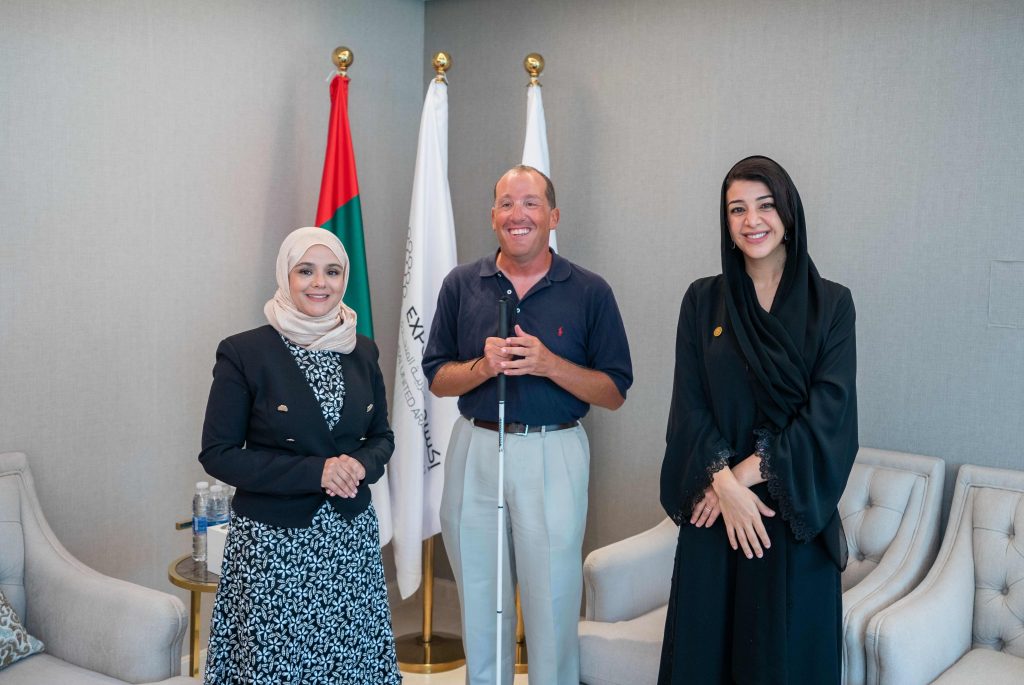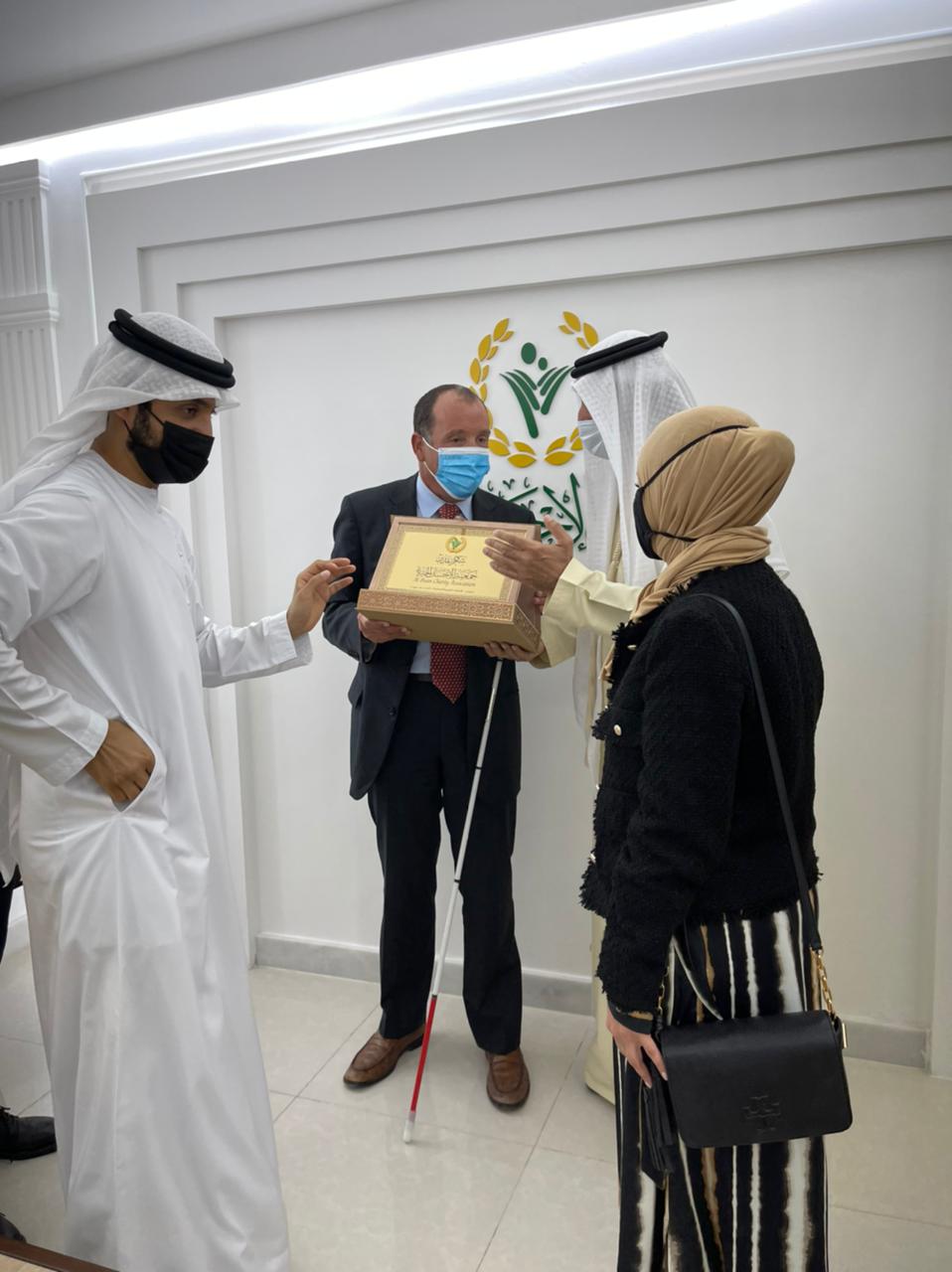Amid Israeli-Palestinian Conflict, Michigan Supreme Court Justice Brokers Help for People With Disabilities
The escalating violence in the region is the most intense it has been in years. But Richard Bernstein, who is Jewish and blind, says “in this region, when a window opens, it is essential that you pass through it.”

Michigan Supreme Court Justice Richard Bernstein, who is both Jewish and blind, has been in the Middle East since the beginning of the year, first in Arab countries, now in Israel.
He’s developing joint programs with Israel and Arab nations to help those with disabilities.
Bernstein’s also spending his nights in a bomb shelter in Tel Aviv. He says his work continues, even under a rain of rocket attacks.
Listen: Michigan Supreme Court Justice Richard Bernstein describes life in a bomb shelter and his efforts to help millions of disabled people in the Middle East.
Michigan Supreme Court Justice Richard Bernstein: The evenings tend to be the more challenging time. The vast majority of rockets get sent over at night. So you know that when the sun sets, then the sirens will start to go off. You have 90 seconds to get into the bomb shelter, then you’re going to feel the explosions. And that’s going to go on for a little while. And then it’s going to ease off, you’re going to have a break, and then a short time later you’re going to feel it again. The intensity is going to come back and you’re going to feel the building shaking. It’s going to ease up and then it’s going to come back again. And for me, as a blind person, the sensation is magnified. You can hear the missiles, but what makes the really intense noise is the Iron Dome, which is the sound of another missile being shot up into the sky. You hear a boom. And then a really intense noise, which is boom! Boom! Boom! And that’s when the Iron Dome missile is colliding with the missile that’s coming towards you.
Quinn Klinefelter, WDET News: The Iron Dome is the Israeli defense system that they have set up.
That’s correct. So you can hear the intercept. And then the whole building shakes, it literally rattles and shakes, the building just rocks. And that goes on for quite some time. You tend to know that the evenings are going to be a little difficult. So it’s not really a surprise. The days tend to be a little bit quieter, but not always. We were at a lunch meeting and there were a hundred missiles headed for Tel Aviv. So in the middle of the luncheon, the siren goes off and everyone goes into a shelter. And then you hear the same thing, you hear the boom, boom, boom! And then sometime after that occurs you go back into the luncheon and everything just moves on. You kind of learn that you just have to be resilient. And everything just kind of moves forward. It was a way of life that you have to accept. But no one should have to live like this. You know that tonight, when the sun sets, we’re going to go through this all again. And it comes in waves all throughout the night.
For me, this is just something that [I’m] going to ride out. Because my role in all this is to help develop programs and services that will help people with disabilities within the Arab world. In fact, in the UAE, they don’t refer to people like myself as people with disabilities. We are referred to as people of determination. And I love that expression. They have the want and the drive and the passion to basically change the lives of people with disabilities all throughout the region and all throughout the world. And here’s the beautiful part of it. Israel has the technical knowledge, the technical support that it’s able to provide, to create the services that are necessary to the Arab world to do good.
There is a real sense for years and years and years of suspicion and fear and anger or hatred on both sides. That seems like that’s a quite a bit to try to overcome.

I think you’re right. But here’s the thing. One of the things that I was responsible for in the UAE, one of the things I was asked to do, was to do a lot of interviewing with Arab media. Most of the Arab networks are based out of the UAE. And this went all over the region. The reason that I was asked to do it was based on what you just said. Most of these networks, and for most of these newspapers, it was the first time they had ever featured a Jewish person in a positive, favorable, extensive light. On top of that, what it also meant was seeing somebody with a severe disability. And that was kind of unique because it helped to break down stereotypes and a stigma that had developed. But what you have to realize is that the Middle East is about windows. And the windows present opportunities. I was told that look, you’re connecting with people, they’re connecting with you. Because of the fact that you’re a judge, because of the fact that you’re blind. It allows people to understand struggle. And what you find is that people with disabilities have a common thread. Everybody is affected by disabilities. Everybody either has a disability, has a relative with a disability, a friend with a disability or a neighbor with a disability. In this region, when a window opens, it is essential that you pass through it. It doesn’t happen often. And if you let that window close, it might not open again. And I was asked to just keep going and keep doing what I was doing, because I was told that it was working. Is it going to change overnight? Is all of a sudden one interview on an Arab network going to change people’s perception of Jewish people? Absolutely not. But do I think it’s a hell of a start? And do I think that so far, we’re on a good journey and a good path? I absolutely do.
How long do you anticipate being in the region?
I’m working pretty intensively on two jobs right now. Because the one thing about being up all night and being in the bomb shelter is that it gives me ample time to work on my court cases. Everybody is working virtually right now. The [Michigan Supreme] Court is closed, the building is closed, we’re not allowed to meet with staff in person. As long as I’m able to make sure that I get everything done and get everything done well … And I’m very proud of this, I have to say, my chambers is ahead on all materials. In terms of our opinions, in terms of our workload, we are ahead of schedule. This is a once-in-a-lifetime opportunity, the chance to build schools and develop programs and services for millions of people. How do you not participate in that? As soon as the work is concluded here, meaning that as soon as I’m no longer required to be in person, I’ll be able to come home. Or as soon as we go back to court in person. Whichever one comes first.
Watch: Michigan Supreme Court Justice Richard Bernstein outlines his vision to help disabled people in the Middle East during a recent primetime interview on Dubai TV.
Trusted, accurate, up-to-date
WDET is here to keep you informed on essential information, news and resources related to COVID-19.
This is a stressful, insecure time for many. So it’s more important than ever for you, our listeners and readers, who are able to donate to keep supporting WDET’s mission. Please make a gift today.
